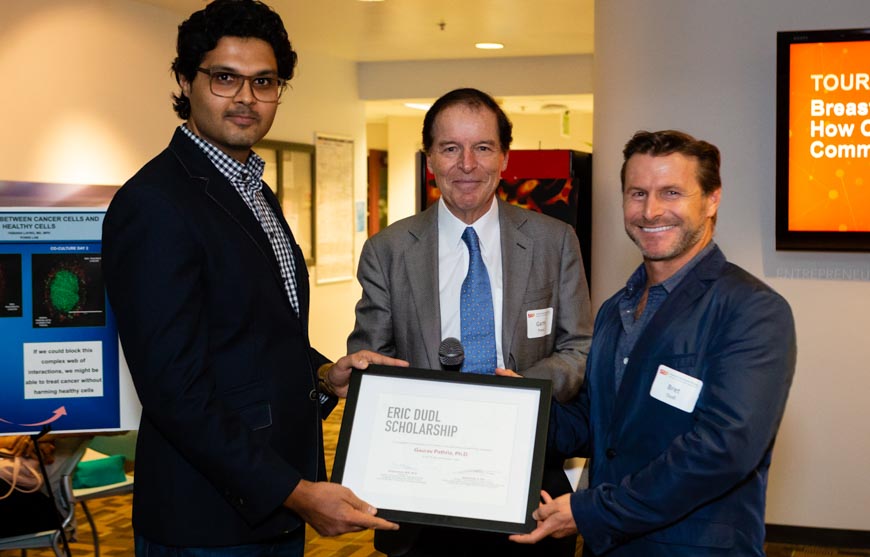Twelve years ago, Eric Dudl had begun his postdoctoral research at Sanford Burnham Prebys Biomedical Research Institute (SBP) when he received shocking news. He had the same disease he was working to eradicate: cancer.
Despite his diagnosis, Eric didn’t stop working. He returned to the lab after a day of hospital treatments—hoping his research might be able to help others, even if he couldn’t help himself. But the cancer was aggressive, and nine months later he passed. He was 33.
Today, Eric’s memory lives on with the Eric Dudl Endowed Scholarship Award. This program recognizes an exceptional postdoctoral researcher working on cancer. Garth Powis, D. Phil., professor and director of SBP’s NCI-designated Cancer Center, selects awardees based on their demonstrated dedication and passion for cancer research.
This year’s recipient is Gaurav Pathria, PhD, a senior postdoctoral associate at SBP in the laboratory of Ze’ev Ronai, PhD, a professor at the NCI-designated Cancer Center. Pathria received the scholarship at SBP’s Cancer Center Open House in November.
“This award is special to me because it is more than a grant—it’s also incredibly inspiring,” says Pathria. “If a sick person can have such zeal and motivation to try to cure this terrible disease, then people in health can truly give it their all.”
After the award ceremony, attendees had the opportunity to speak with SBP’s cancer scientists during poster discussions and presentations. Topics ranged from the microbiome’s response to cancer therapy, how pancreatic cancer cells “eat” and the way breast cancer cells communicate.
Due to this engaging format, the event has attracted large crowds since its launch. This year a record 110 people attended.
Pathria’s focus: making existing medicines work again
Lately, restricting nutrients has garnered interest as an approach to treating cancer. However, scientists are now learning that in response to nutrient limitation, cancer cells often find alternative ways to gather food, grow and survive. For patients, this means the cancer returns, and often in a more aggressive form.

melanoma uses to keep growing. Then, scientists
could potentially block them—and kill the cancer.
“Imagine you are taking the freeway, but you hit traffic. You may take the next exit and drive on side streets to avoid congestion and still reach your destination,” explains Pathria. “Cancer cells operate similarly. When they experience road blocks—such as lack of nutrients—they find alternate routes.”
Pathria is working to identify these alternative growth pathways, with a focus on melanoma, the deadliest skin cancer. Once all these escape routes have been mapped, scientists could potentially block them—and kill the cancer.
Pathria cites the example of BRAF inhibitors for melanoma, a targeted treatment sometimes called a miracle drug. The medicine is remarkably effective, but patients often develop resistance—sometimes in as little as months.
“We have medicines on the shelf today that work—it’s just that cancer cells are smarter,” Pathria says. “If we knew the alternative paths the cancer cells take to continue growing after treatment, we could block each route—similar to placing a barrier at a freeway exit to capture an outlaw. This means we could stop treatment resistance and potentially make existing drugs work again.”
Pathria’s work has already identified an alternative growth pathway that melanoma cells use when they don’t have enough nutrients. The discovery was published in EMBO Journal. But these findings are only the beginning for his work.
“I know I want to dedicate my life to solving the riddle of cancer’s resistance pathways—though I certainly hope it doesn’t take a lifetime to do so,” Pathria says. “Knowing Eric Dudl’s story—and receiving an award in his honor—only inspires me to work even harder to conduct excellent science that leads to better cancer treatments.”
Read more about the Eric Dudl Endowed Scholarship Fund, including an opportunity to donate.
Interested in keeping up with SBP’s latest discoveries, upcoming events and more? Subscribe to our monthly newsletter, Discoveries.
